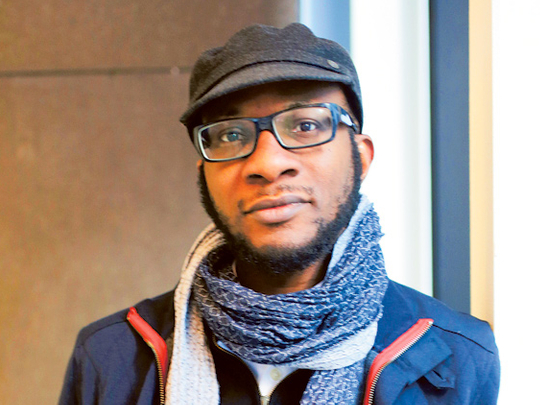
Teju Cole likes to keep his writing porous, allowing in influences and impressions with a kind of deceptive blankness that the reader is invited to make sense of.
In “Every Day Is for the Thief”, his unnamed hero, browsing in a bookshop in Lagos, sees copies of novels by Penelope Fitzgerald and Philip Roth. On a bus across the city, he checks out a girl, who, to his surprise, is reading one of his favourite authors: Michael Ondaatje. As he stares at her, he likens the imprint of her face on his mind to “an image made with the lens wide open”, a reference to Isherwood, another of his literary heroes.
At 38, Cole has published two novels. The first, “Open City”, was sufficiently well received to invite a reprinting of what was in fact a book that preceded it, “Every Day Is for the Thief”, the lightly fictionalised travelogue of a man returning to his native Lagos after many years in America.
This was Cole himself, almost 10 years ago, and he wrote the book while toiling over a PhD in art history at Columbia University in New York. It was published in 2007 by the relatively small Cassava Republic Press in Nigeria, without any great fanfare, after which, with few expectations of gaining a bigger audience, Cole started work on “Open City”. His life was about to change.
Today, he is sitting in a café in New York, after rushing between meetings and commitments that make him marvel at the ease of Manhattan life compared with that of Lagos.
Cole was born in Michigan, where his parents were both studying at the time, and moved back to Nigeria with his family as a baby, returning to the United States to go to university when he was 17.
The protagonists of both his books are dual heritage, half-Nigerian, half-European, which Cole uses as a device that allows them to stand back from their environments, and that is also in line, perhaps, with his general instincts: to buy himself as much space as possible by evading categorisation. He doesn’t define himself as a writer, wholly, but as a photographer, too, and he gets just as much pleasure from seeing his photos in print as he does his writing.
His interests are thrown out wide across the spectrum he has been recently listening to the new Beck album on a loop, which he likes for its “meditative and dreamy” quality.
“Open City” is a novel now moderately famous for unfolding at “walking pace”, the opening pages describing the protagonist, a Nigerian-German psychiatrist, as he wanders around his Manhattan neighbourhood taking in sites and sounds, triggering domino-runs of memories, at a slow speed that is completely antithetical to the commercial requirements of most novels.
“Every Day Is For the Thief” runs along similar lines, allowing the reader simply to travel with the narrator as he moves around the city, occupied with his own thoughts. “The bus crosses from Yaba over the Third Mainland bridge into Lagos Island. In the shadow of sky-scrapers, half-nude men in dugouts cast nets into the lagoon. The work of arms and shoulders. I think of Auden’s line: Poetry makes nothing happen.”
This kind of approach was not a plan, says Cole.
“I didn’t really know what I was going up against.” He just wrote what he wanted to write, with both books, “without thinking how they were going to be received in the marketplace as works of fiction. So that allowed me to be difficult. I do have an experimental instinct and I thought that meant I was condemned to writing for completely obscure publishers. And I was fine with that. The fact that those books then became interesting to publishers was a pleasant surprise.”
He wrote the books in quick succession, supported by his wife, an Indian-born social worker, and while simultaneously trying to finish his PhD “so both of these books are acts of procrastination”.
Cole had no real expectation of becoming a full-time novelist. Even the PhD seemed like a whimsical departure from more sensible options; like many brainy, middle-class Nigerian youth, Cole had first enrolled in medical school, before realising it wasn’t for him. As he says wryly: “I’m an African kid. I’m not going to go straight into writing.”
Art history is a passion, but some way into the course, he started to find academic writing frustrating.”While doing the dissertation, I wrote two books — so both of these books are acts of procrastination. They also became acts of understanding a form of address that satisfied me, or that I found more fulfilling.
“I guess you’re never satisfied, really. But as a writer, as a creative person, the very stringent, offensively foot-noted writing that was required to be an academic art historian lost its shine for me.”
Writing “Every Day Is For the Thief” felt like a liberation, not least because the veneer of fiction allowed Cole to be much more damning about the shortcomings of his home town than he would ever have dared to be, writing as himself.
“There is venality in abundance here,” he writes at one point, “and the general air of surrender, of helplessness, is the most heart-breaking thing about it. I decide that I love my own tranquillity too much to muck about in other people’s troubles. I am not going to move back to Lagos. No way. I don’t care if there are a million untold stories, I don’t care if that, too, is a contribution to the atmosphere of surrender.”
At the same time, the impressionistic sweeps are so vivid that it is the kind of writing that stays in the mind long after you have finished reading it. Cole’s tongue-in-cheek line about John Updike has been much enjoyed and repeated — “Had John Updike been African, he would have won the Nobel prize 20 years ago”, since the material at Updike’s disposal would have been so much more colourful and abundant than that of his relatively bleached beginnings in Shillington, Pennsylvania.
“I suddenly feel a vague pity for all those writers who have to ply their trade from sleepy American suburbs, writing divorce scenes symbolised by the very slow washing of dishes,” writes Cole, with a wink.
The practicalities of life in Nigeria, however, are a source of great regret and bafflement to Cole. Lagos is not an easy city to live in, not just because of power cuts and the frequent disruption of other services but because of the mentality this has engendered in the population.
“As a friend of mine refers to it,” he says, “Nigeria is the Federal Republic of Anyhowness. There’s an uninspired improvisation it’s not jazz. And it’s not modern dance. It’s uninspired; it’s the person who looks in the fridge and says, well, there’s that pasta from last week, and I guess I have some tofu from last night. I’ll mix it together. And you don’t have to live that way. You could have more energy. How can a place be so interesting, full of history, and real human conflict, and at the same time, as slow as molasses.”
This is symbolised for Cole by the terrible traffic: it is not unusual in Lagos, he says, for people to get stuck in three-hour jams and the knock-on effect registers in the national psyche.
“This sense in Nigeria of feeling yourself a contemporary equal to everyone in the world — you’re interested in fashion, engineering and infrastructure. You like architecture and nice hotels and all those things; and yet you’re experiencing life there at such a severe disadvantage to everyone else in the world who is also a citizen of a modern city. That is my frustration. The fact that Nigeria itself stymies the effort we make to be equal with people in London or New York.”
With a sardonic smile, he says: “If you’re British, you’ve met a lot of Nigerians and know they are the most intense, go-getting sort of people. So you would think that the country would be like South Korea or something. But no. It has somehow managed to cannibalise itself.”
Cole sees the slow pace of his books as a positive version of Nigerian lassitude; taking that attitude and making of it something worthwhile and contemplative, rather than time-wasting and empty. And he is still amazed that anyone else should want to read his less defined approach.
Rather waspishly, he says: “If you really want to do this writing thing, you have to write a multigenerational family saga, or you have to learn the mechanics of that language and you’ll take your chances like everyone else, and maybe you’ll be one of those young people who will get reviewed widely and get a lot of readers. The satisfaction of not having done that is just amazing. I feel like I won the lottery, actually.”
Cole has been vocal on Twitter about the Nigerian girls kidnapped by Boko Haram, in terms of both criticising the Nigerian government and the tenor of some of the coverage. It is a tricky balancing act, he says, because it’s “hard to write about it without falling into some of the clichés of ‘disorderly Africa’. And without giving into the generalisations that mar reporting in Africa. Also just on a pure writerly level, it’s hard to write about not much happening.”
If Cole has an outstanding talent, however, it is exactly this — his ability to write about not much happening.
Like Joyce Carol Oates and Margaret Atwood, Cole is one of the few novelists who sees Twitter as an extension of, rather than a distraction from, his work. He isn’t afraid to start a fight on social media and frequently challenges what he sees as lazy or pernicious opinions, particularly from western reporters writing about Africa.
“The question could be: why are you so political?” he says. “Whereas my question would be: why aren’t you? And I think that comes from the non-American part of me which is saying that novelists in every other country, with the exception of the American or the Anglo-American sphere, actually consider it part of their work to engage.”
Uniquely among Twitter users, perhaps, Cole isn’t afraid to talk about how seriously he takes it, and his tweets — jokes about current events, or cleverly compressed critiques, for example of the World Cup “World Cup Protests Marred By Opening Ceremony” — are, he says, the fruit of as much time and thinking as anything else he writes. “I write drafts.”
Of tweets?!
“Yes, I know it’s weird. It’s a little bit annoying, also. Two drafts of a tweet? Insufferable. But what’s the point in being ashamed of your instrument? And writers in the past were pamphleteers. There are so many different ways to disseminate ideas and put them out. And this just happens to be mine. I often have to tell myself it’s OK to be a writer. And it’s OK that not everyone is. But I am, and I’m going to do that. It’s like saying, Oh, someone’s an accountant and when they’re reckoning the bill in a restaurant, they can afford to be sloppy because they’re an accountant all the time. When I tweet, I’m still a writer.”
He is at present working on a nonfiction book about Nigeria that has taken years and is much more fact-based than “Every Day Is for the Thief”; it involved many interviews and research trips and a different style of writing from what has come before. The first approach appeals to him, he says, “because it’s unfiltered”, but also because it gets at the subject matter via tangential means.
Slowly, he has come to understand that this is how his fiction works. Writing a short story last year — which was ultimately abandoned because he was dissatisfied with it — made Cole realise that the best way for him to get at an issue is by placing its lightly off-centre.
The more he analyses it, the more he realises that what he is doing is something specific to his emotional, aesthetic and intellectual needs.
“Do you remember the musician Moby?” says Cole. “I remember reading an interview with him, and he said he was obsessed with the question of how you make a hit. And then he did an album, and every track on that album was a hit and being used for a commercial. So strange. And for some reason I think about that, maybe because we experience the thing as music, but he’s given an account of it as his obsession with making a hit.”
And so, he says, “my obsession, no matter how anyone else perceives it, is creating a space. Always. It’s actually quite hard to describe. I wanted to slow down the timeline of the person reading it.”
This goes for all of his output; the novels, the journalism, even the Twitter feed. “I wanted to infuse their particular stream with a new energy and I actually sit and think about this.”
It’s a kind of writing he describes as “not completely invertebrate, but it’s certainly flexible. There’s a pliancy to it that you really have to stay with, and everything I’ve written so far is the same: just be with me in this space. And we’ll see what happens.”
–Guardian News & Media Ltd








